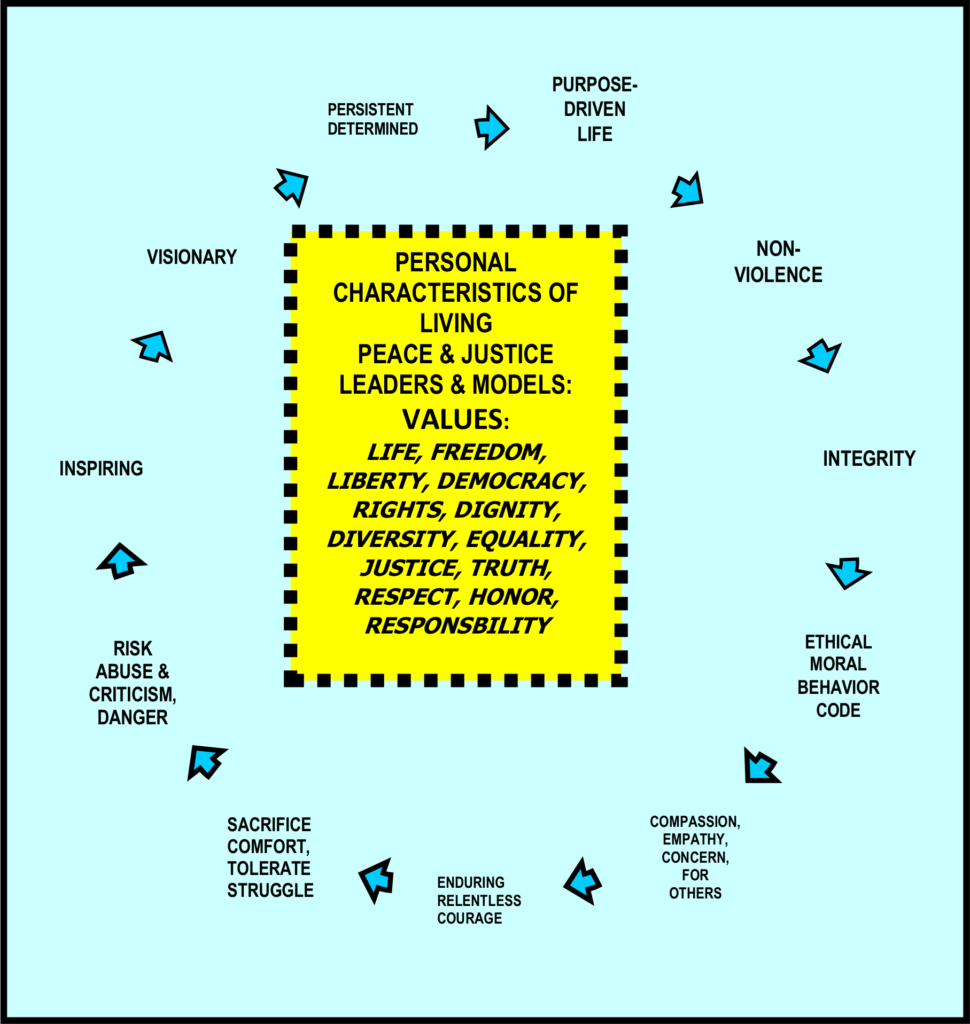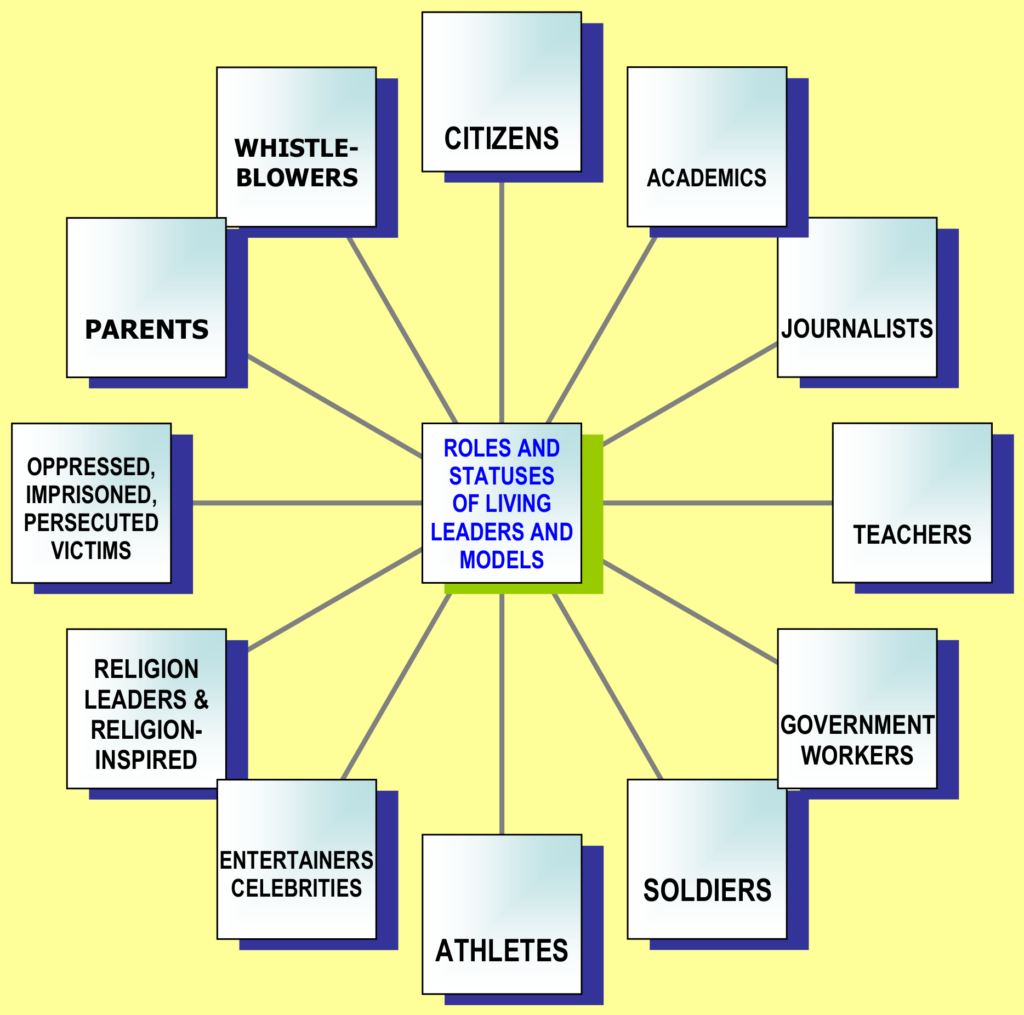100 Living Peace and Justice Leaders and Models (List #4)
TRANSCEND MEMBERS, 6 Aug 2018
Anthony J. Marsella and Kathleen Malley-Morrison – TRANSCEND Media Service
3 Aug 2018 – This Fourth List of Living Peace and Justice Leaders, continues our efforts to honor the life and work of Reverend Martin Luther-King, Jr. Reverend King’s legacy of peace, justice, and non-violence, changed the world, inspiring freedom and hope to lives oppressed by evils of racism and political rank and status.
Reverend King’s commitment compels us to continue his efforts beyond the words, song, promises, and protests of his day. Reverend King’s assassination was not the work of a single individual consumed with hate, but as subsequent trials indicated, the result of criminal acts by corrupt government officials, fearful of the of the consequences for change Reverend King inspired. Reverend King, we believe, knew even as he anticipated his tragic death, his truths would endure.
We are eternally grateful for Reverend King’s efforts to free people and nations from the brutal oppressions imposed by governments, nations, societies, organizations, and individuals. Our spirits are buoyed by the thousands of living peace and justice leaders and models whose activism and advocacy insure Reverend King’s sacrifices will not be forgotten but will endure.
LIST 4
As in prior published Lists, individuals cited on List 4 represent a variety of demographic markers, including gender, ethnicity, race, age, nation, religion, and life-style persuasion and preference. By accessing the URL accompanying the person’s name, you can read of their peace and justice activism and advocacy.
Our choice of the number, 100, is arbitrary, for there are thousands of individuals who deserve citation. Most are not listed; we will continue to create Lists for future efforts. Do not be dismayed! Patience! Lists of living peace and justice activists and advocates help foster peace and justice.
In the face of abuses and oppression, in the face of bias and insult, in the face of persecution from government and private sources, as evidenced by the betrayal and misuse of the secret FISA Court’s politicization and weaponization, we recall and honor iconic peace and justice leaders of the past, including Mahatma Gandhi, Martin Luther King, Jr., Nelson Mandela, Jane Addams, Samuel Gompers, Caesar Chavez, Larry Itliong, Rachel Corrie, Philip Berrigan & Daniel Berrigan, Glenn Paige, Hedy Epstein, Malcolm X, and hundreds of others.
The presence of peace and justice advocates and activists across time and place are testimony to the enduring human spirit to resist oppression, to claim liberty, and to endure, even at the cost of life. Individuals recognized on List 1, List 2, List 3, and now, List 4, are part of the tradition of resistance to oppression and the commitment to peace and justice though non-violence. Peace and justice leaders occupy a special “sacred” status in our minds and hearts for their efforts to advance the human condition.
And then there are the beautiful and inspiring words from the Sermon on the Mount resonate across time and place: “Blessed are the peace makers, for they shall be called children of God.” (Matthew 5.9 KJV).
In commenting on the many demands placed upon of those pursuing peace and justice, Marsella (2017) wrote:
In answering the call, your life will not be the same. You will be required to face harsh realities; you will be singled out for abuse from reactionary forces whose inhumanity keeps them locked in hate. Your life itself will be at risk. What will not be at risk, however, is your personal integrity, your dignity, your identity, and your position of gratitude, respect, and admiration in the heart and minds of those you help. Pursuit of justice is not for the faint of heart. You can expect condemnation, ridicule, insult, entrapment, and defamation; costs are high, but rewards are more than gold or silver; rewards come in knowing in our brief time on Earth, you have done something to advance the cause of “justice.”
SPIRIT OF OUR TIMES
- Inclusion – There is a new spirit of encounter, inclusion, and protest in our times (e.g., Anti-Fascism, Anti-Islamophobia, Black Lives Matter; Me Too, LGBTQ Movement, Pro-Choice, Refugees Matter, Sanctuary Cities). Tangible evidence is displayed in countless national and international gatherings numbering in the millions of participants.
- Communications and Connection – There is a new spirit of communication and connection among the growing number of “Free Media” critical of government, military, and private corporate controls!
- Protest – There is a new spirit of protest against concentrations of war, militarism, power and position in the hands of a few (i.e., Secret State, Deep State, Secret State). The expenditure of a nation’s diminishing wealth on the purchase military and nuclear weaponry, endless wars, and genocides, has mobilized citizens across the nations and world.
- Consciousness of Life and Land – There is a new spirit of concern for life and land, especially regarding anthropogenic climate changes! The concern is national and global. Activists are protesting destructive developments and supporting climate change policies to limit Co2 release. Animal, Plant, and Natural Resources Rights have joined Human Rights as areas of concern and protection. This reflects a consciousness of the flaws in human mastery assertions articulated in Biblical admonitions contending God made mankind (sic) master of all things and in his (her) image.
- Investigate, Expose, Uncover – There is a new spirit of determination to investigate, expose, and uncover abuses of privilege and position by select government official who have politicized and weaponized laws for personal use (e.g., FISA Court).
Hope
These changes signal and sustain “Hope!” “Hope” is the life blood of progressive change. “Hope” can be suppressed and oppressed, but it cannot be defeated. “Hope” endures because it is the very essence of life. Regardless of life form and specie. “Hope” is the evolutionary impulse to pursue survival, adaptation, and adjustment, free of oppression.
Be not afraid! You are not alone! There are thousands of advocates and activists across the world bringing conscience to the struggle for peace and justice. It is the endless story of individuals from all walks of life, willing to endure the trials and tribulations of speaking for peace and justice in settings in which abuses and oppression of human rights and legal rights are violated by those holding power and position.
Goals of Peace and Justice: New Moral Order
Almost two decades ago, David Reiff (1999), in his classic paper, “The precarious triumph of human rights” (New York Times Magazine, August 8, pp. 36-4) articulated his view of “new moral order” characteristics; his thoughts were prescient:
- Civil society;
- Humanitarianism;
- Human rights versus state sovereignty;
- Emergence of human rights activists, development workers, aid experts committed to needs of an interdependent world;
- Small is beautiful;
- Democracy building;
- Growth of NGOs;
- Considering individual as well as state rights;
- Plans for a permanent international criminal court.
- Decentralization; Non-violence; Grass Roots (Added)
Before sharing our Fourth List, we wish to include two charts offering graphic displays of essential material for understanding and appreciating living peace and justice leaders.
CHART 1: PERSONAL CHARACTERISTICS OF PEACE AND JUSTICE LEADERS AND MODELS
CHART 2: ROLES AND STATUS OF PEACE AND JUSTICE LEADERS AND MODELS
We submit the following List of Living Peace and Justice Leaders and Models. We are grateful for their efforts and sacrifices.
LIST 4
- Al-Obaidi: Abdul Kareem Al-Obaidi, mental health advocate for victims of war and terrorism
- Ashy: Majed Ashy, advocate for peace and human rights as pre-requisites for mental and physical health
- Arkin: William Arkin, investigative reporter, Washington Post, Top Secret America
- Atkinson: Moya Atkinson, social worker, addresses prisoner isolation
- Atran: Scott Atran, anthropologist, studies terrorism
- Bamford: James Bamford, author, journalist, focuses on NSA
- Beam: Amy L. Beam, humanitarian assistance for Yazidis
- Beydoun: Khaled Beydoun, expert on institutionalization of Islamophobia
- Billoo: Zahra Billoo, civil rights activist, exec. director San Francisco Bay Area chapter Council on American Islamic Relations
- Bourgeois: Father Roy Bourgeois , founder of the human rights group School of the Americas Watch
- Boyce-Simms: Pamela Boyce-Simms, Convenes the Mid-Atlantic Transition Hub (MATH), a six-state network of environmental activists
- Braun: Marie Braun, anti-nuclear weapons activist
- Bronzaft: Arline Bronzaft, environmental psychologist, activist & leader
- Brown: Craig Brown, progressive community organizer
- Benjamin: Medea Benjamin, co-founder Code Pink
- Chailert: Lek Chailert (Thailand), Elephant Nature Park Care
- Chung: Rita Chung, GMU professor Global Refugee Trauma Work
- Cohn: Marjorie Cohn, legal scholar, political analyst, social critic
- Conley: Julia Conley, staff writer Common Dreams
- Corbett: Jessica Corbett, Common Dreams writer
- Cunningham: Finian Cunningham, newspaper journalist focusing on international affairs
- Daley-Harris: Sam Daley-Harris, hunger eradication advocate and democracy activist
- Dariyani: Angad Dariyani Aims at solving large-scale problems for developing countries like India
- Davis: Martha Davis, film director, On the dark side
- Dellums: Ronald Dellums, civil rights and anti-war activist
- Desai: Miraj Desai, researcher focusing on cultural, community, and social justice perspectives on mental health
- Dharm: Bhawuk Dharm, research on cultural sensitivity, ethics, whistle-blowing
- Dorrel: Frank Dorrel, anti-war film maker
- Dueck: Alvin Dueck, peace psychology teacher
- Ecklein: Joan Ecklein, peace and social justice activist
- Erakat: Noura Erakat, human rights attorney, writer, activist, specialist in Israeli-Palestinian conflict
- Fisk: Robert Fisk, war zone Guardian correspondent
- Flanders: Laura Flanders, author, journalist, Fairness and Accuracy in Reporting (FAIR).
- Frompovich: Catherine Frompovich, health rights advocate, journalist
- Gaynor: Maureen Gaynor, disability activist, supporter of civil disobedience
- Gattinger: Malvin Gattinger, Transcend Media Service staff (webmaster)
- Gold: Ariel Gold, Jewish mother, BDS activist, pro-Palestinian, Code Pink leader.
- Gonzalez: Naomi Emma Gonzalez,leader in youth-led gun control student movement.
- Haque: Umair Haque, inspirational writer
- Hightower: Jim Hightower, progressive political activist, supporter of sustainable agriculture
- Huerta: Delores Huerta, labor leader and civil rights activist. Worked with Caesar Chavez in founding United Farm Workers Union
- Jackson: Richard Jackson, Director of the National Centre for Peace and Conflict Studies.
- Johnson: Jake Johnson ,Common Dreams writer
- Jones: Preston Jones, professor, peace activist on American Empire
- Kent: George Kent, Teaches human rights, on the Board of Directors of the International Peace Research Association Foundation.
- Klare: Michael T. Klare, Five College Professor of Peace & World Security Studies
- Kolhatkar: Sonali Kolhatkar, columnist for Truthdig, co-director of the Afghan Women’s Mission,
- Kunstler: Barton Kunstler, Author, Nation of change.
- Laurison: Hannah Burton Laurison, human rights activist.
- Lillard: Kwame Leo Lillard, Nashville civil rights leader
- Loladze : Irakli Loladze, professor, Environment of Food Supply
- McKay: Donna McKay, active with Physicians for Human Rights.
- McKibben: Bill McKibben,leading environmentalist in USA
- Melamed: Barbara G. Melamed, psychologist, promotes women’s peacebuilding, mediation
- Milton-Lightening: Heather Milton-Lightening, international Indigenous Peoples advocate, activist for ending Gaza blockade.
- Mingo: Erika Mingo, Past President, PSYSR; Racial Justice Action Group
- Munayyer: Yousef Munayyer, US Campaign for Palestinian Rights
- Mutaka: Christophe Nyambatsi Mutaka key figure at the Groupe Martin Luther King; promotes active nonviolence, human rights, and peace, focuses on reducing sexual and other violence against women.
- Nair: Keshavan Nair, Gandhi scholar
- Neville: Helen A. Neville, Professor, African-American Studies/Gender and Women’s Studies, University of Illinois, Champaign-Urbana
- Nyarwaya: Eddy Kalisa Nyarwaya Jr. Executive Secretary of the Rwanda Institute for Conflict Transformation and Peace Building; President of the Alternatives to Violence Program
- Orlov: Dmitry Orlov, predicts cultural, financial, commercial, and political collapse in US and elsewhere.
- Pauli: Richard Pauli, climate activist
- Pepper: William F. Pepper, attorney, investigator of assassinations, represented MLK’s family in a wrongful death lawsuit
- Pitt: William Rivers Pitt, Teacher, writer, political activist
- Prasad: Surya Nath Prasad, writer, Transcend Media Service, supporter of universal peace education
- Prysner: Michael Prysner: S. army veteran, political activist
- Priest: Dana Priest,investigative reporter, Washington Post, Top Secret America book
- Pulley: Aislinn Pulley, Chicago Black Lives Matter, African American leader
- Quam: Lois Quam, activist for health care and the environment.
- Reimer: Kevin Reimer, peace psychology professor
- Richards: Cecile Richards, President of Planned Parenthood
- Richtman: Max Richtman, President/CEO of the National Committee to Preserve Social Security & Medicare
- Schindler: Stefan Schindler, Peace scholar, poetry for peace activist
- Seed: John Seed, Saving the Rain Forests
- Stevenson: Bryan Stevenson, Slavery Museum
- Stone: Oliver Stone, film maker
- Sulik: Gayle Sulik, Breast Cancer Founder
- Sundarajan: Louise Sundarajan, Indigenous Psychologies ; Humanistic Psychologies
- Tatour: Dareen Tatour, Palestinian citizen of Israel charged with inciting violence with her poetry.
- Thapa: Lily Thapa, Single Women for Human Rights in Nepal
- Theoharis: Liz Theoharis Co-Chair of the Poor People’s Campaign: A National Call for Moral Revival
- Todhunter: Colin Todhunter, writer, critic of international agribusinesses.
- Toon: Brian Toon climate research
- Torres-Rivera: Edil Torres Rivera, LatinoX Counselors for Social Justice activist
- Townsend: David Townsend, J.D., Attorney, Mediator, Activist
- Turbeville: Brandon Turbeville Writer for Activist Post, host of Truth on the Tracks, a weekly news roundup serving as a hub for activists, information, and solutions.
- Tverberg: Gail Tverberg, Energy and Peak Oil Analyst
- Vitchek: Andre Vitchek, revolutionary, internationalist, and globetrotter fighting Western imperialism
- Vilkomerson: Rebecca Vilkomerson, Executive Director, Jewish Voice for Peace
- Wagner: Richard Wagner, Peace psychology pioneer.
- Wallace: Timmon Milne Wallis, Director of Peaceworkers UK.
- Ward: Eric K. Ward, long-time civil rights strategist
- Wedler: Carey Wedler, Editor, Anti-Media
- West: Doe West, Native American scholar, pastor, social justice activist, disability rights advocate.
- White: James A. White Jr., Prisoner who started numerous educational programs for prisoners
- Wolff: Richard D. Wolff, Author, Marxist economist
- Yumbo: Elisvan Greffa Yumbo, Peruvian activist fighting for protection of Amazon waters from oil industry.
- Young: Andrew Young civil rights activist, U.S. Representative, Pastor, diplomat, mayor, educator.
- Zimoz: Sergey Zimov, climate change activist working to preserve life in the Artic
___________________________________________________
 Anthony J. Marsella, Ph.D., a member of the TRANSCEND Network for Peace Development Environment, is a past president of Psychologists for Social Responsibility, Emeritus Professor of psychology at the University of Hawaii’s Manoa Campus in Honolulu, Hawaii, and past director of the World Health Organization Psychiatric Research Center in Honolulu. He is known internationally as a pioneer figure in the study of culture and psychopathology who challenged the ethnocentrism and racial biases of many assumptions, theories, and practices in psychology and psychiatry. In more recent years, he has been writing and lecturing on peace and social justice. He has published 21 books and more than 300 articles, tech reports, and popular commentaries. His TMS articles may be accessed HERE and he can be reached at marsella@hawaii.edu.
Anthony J. Marsella, Ph.D., a member of the TRANSCEND Network for Peace Development Environment, is a past president of Psychologists for Social Responsibility, Emeritus Professor of psychology at the University of Hawaii’s Manoa Campus in Honolulu, Hawaii, and past director of the World Health Organization Psychiatric Research Center in Honolulu. He is known internationally as a pioneer figure in the study of culture and psychopathology who challenged the ethnocentrism and racial biases of many assumptions, theories, and practices in psychology and psychiatry. In more recent years, he has been writing and lecturing on peace and social justice. He has published 21 books and more than 300 articles, tech reports, and popular commentaries. His TMS articles may be accessed HERE and he can be reached at marsella@hawaii.edu.
 Kathleen Malley-Morrison, Ed.D., Director of the Group on International Perspectives on Governmental Aggression and Peace (GIPGAP), is a member of the TRANSCEND Network, Professor Emerita of Psychological and Brain Sciences at Boston University. She is the author or coauthor of several books, including Family Violence in a Cultural Perspective, and Family Violence in the United States, as well as editor of the four volume series: State violence and the right to peace: An international survey of the views of ordinary people. She has authored numerous articles and book chapters on violence within relationships and nations. Her current efforts to advance peace and social justice are centered primarily in her blog, Engaging Peace. http://engagingpeace.com. She can be reached at: kathiemm@engagingpeace.com
Kathleen Malley-Morrison, Ed.D., Director of the Group on International Perspectives on Governmental Aggression and Peace (GIPGAP), is a member of the TRANSCEND Network, Professor Emerita of Psychological and Brain Sciences at Boston University. She is the author or coauthor of several books, including Family Violence in a Cultural Perspective, and Family Violence in the United States, as well as editor of the four volume series: State violence and the right to peace: An international survey of the views of ordinary people. She has authored numerous articles and book chapters on violence within relationships and nations. Her current efforts to advance peace and social justice are centered primarily in her blog, Engaging Peace. http://engagingpeace.com. She can be reached at: kathiemm@engagingpeace.com
This article originally appeared on Transcend Media Service (TMS) on 6 Aug 2018.
Anticopyright: Editorials and articles originated on TMS may be freely reprinted, disseminated, translated and used as background material, provided an acknowledgement and link to the source, TMS: 100 Living Peace and Justice Leaders and Models (List #4), is included. Thank you.
If you enjoyed this article, please donate to TMS to join the growing list of TMS Supporters.

This work is licensed under a CC BY-NC 4.0 License.


Kathleen, Tony, thank you both for your recognition of so many of us. We–even those not on the list–persist in this work, not because we are rewarded with great success, but because we know it is the right thing to do.
With much aloha to all, George Kent
[…] ‘100 Living Peace and Justice Leaders and Models (List #4)’, 6 Aug […]